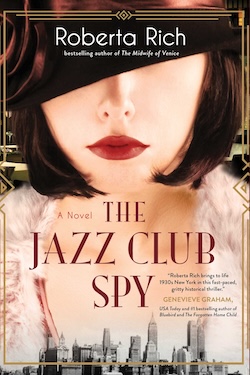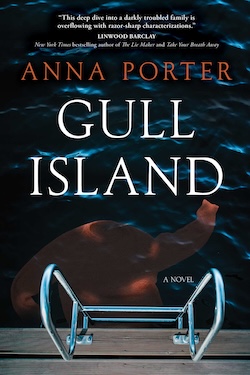The past can consume you if you let it. And reality isn’t as easy to discern as you might think. Two recently published thrillers from Simon & Schuster share these themes in common, but their authors address them in completely different ways.
Anna Porter’s Gull Island takes readers on an unsettling, at-times gory, modern-day journey through the protagonist’s thoughts and memories as she visits alone her family’s isolated island cottage and a ferocious storm hits, unmooring her boat and rendering her cellphone ineffective. Roberta Rich’s The Jazz Club Spy begins with a brutal pogrom in 1920 Ukraine and then jumps to 1939 Manhattan, where the protagonist, now a young woman, sees in passing one of the Cossacks who rampaged her village – as she starts looking for him to exact her revenge, she is enlisted by the US government to help find him for them, as he is a possible conspirator in an assassination plot.
Neither genre – psychological thriller or espionage novel – is the type of fiction I’d generally pick up, but I enjoyed both. They provided an escape, I learned a few things, I wanted to know how they would end.
While The Jazz Club Spy started off gritty and harsh, by the second chapter it read more like a young adult novel. Given the state of the world at the moment, I didn’t find that necessarily a negative thing. I rooted for Giddy Brodsky, who survived that traumatic pogrom and was now helping her family pay the rent and feed themselves, her dad having left for reasons we eventually find out.
 As a cigarette girl in a club, Giddy uses her natural sleuthing skills – looking through customers’ pockets, listening to conversations for clues, etc. – to help her friend Hattie’s clairvoyant act. After Giddy sees the Cossack on a tram, but loses him in the crowd, she puts those skills to personal use, and then uses them to help the government. This happens after she asks a club regular who works in the immigration department for assistance, and he shares with her that the Cossack is an “undesirable” and could she help the government track him down.
As a cigarette girl in a club, Giddy uses her natural sleuthing skills – looking through customers’ pockets, listening to conversations for clues, etc. – to help her friend Hattie’s clairvoyant act. After Giddy sees the Cossack on a tram, but loses him in the crowd, she puts those skills to personal use, and then uses them to help the government. This happens after she asks a club regular who works in the immigration department for assistance, and he shares with her that the Cossack is an “undesirable” and could she help the government track him down.
Giddy is not only a competent detective but an aspiring entrepreneur, who creates her own makeups and lotions. The money she earns from spying goes to help her set up her own beauty store. But, to achieve success, she must first complete her mission, one that is complicated by love and the dangerous situations she must place herself in to root out the Cossack and try to prevent the assassination and a potential global political crisis.
The Jazz Club Spy is all about external threats and heroic acts. There is no doubt about Giddy’s strength, purpose and whether she’s a good person. Gull Island, on the other hand, is all about internal threats and acts that cause harm (even if that isn’t the intent). Jude’s a great unknown, even to herself, and she gets progressively more disoriented as the storm hits the island and she struggles to get the water pump working, hurts herself in various accidents, and drinks we’re not quite sure how much alcohol while she’s there.
 Jude has come to the island at her mother’s request. Jude’s father has gone missing and a copy of his will is apparently at the cottage. She is also there for personal reasons, to rummage about, to figure something out, to look through old photographs; there are many of her sister, not so many of her. Jude has grown up in a dysfunctional family and the cottage was not generally a happy place. As the storms intensify – the rain and wind outside, the memories barraging Jude and the physical cuts and bruises she receives along the way, dealing with broken glass, wild animals and things not so clear – the tension ratchets up. When the sun returns and Jude surveys the damage left behind, a key piece of the mystery is understood.
Jude has come to the island at her mother’s request. Jude’s father has gone missing and a copy of his will is apparently at the cottage. She is also there for personal reasons, to rummage about, to figure something out, to look through old photographs; there are many of her sister, not so many of her. Jude has grown up in a dysfunctional family and the cottage was not generally a happy place. As the storms intensify – the rain and wind outside, the memories barraging Jude and the physical cuts and bruises she receives along the way, dealing with broken glass, wild animals and things not so clear – the tension ratchets up. When the sun returns and Jude surveys the damage left behind, a key piece of the mystery is understood.
Porter isn’t afraid to explore dark places, and she masterfully leads readers through Jude’s turmoil. I found it noteworthy that the book Jude finds at the cottage to read is Sapiens: A Brief History of Humankind by Yuval Noah Harari. “I had abandoned it years ago because I didn’t want to feel as insignificant as the author had made me feel,” thinks Jude. “But tonight, being alone in the cottage, with something digging under the bedroom window, feeling insignificant would be useful.” Spoiler alert: by the end of the novel, she is set to finish the book.
